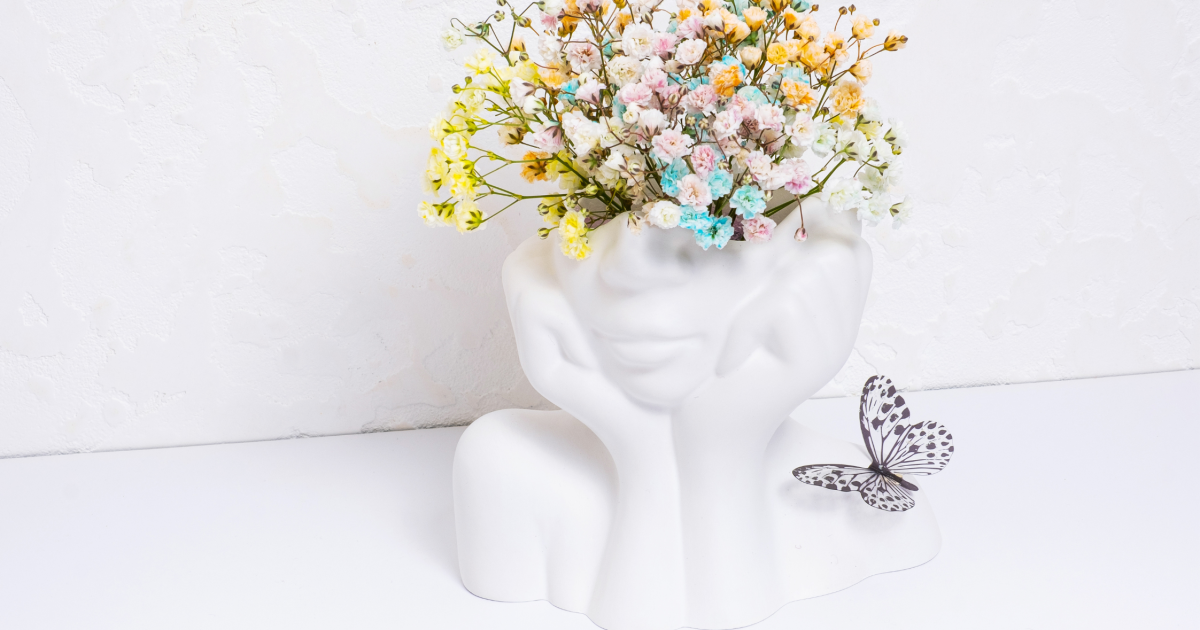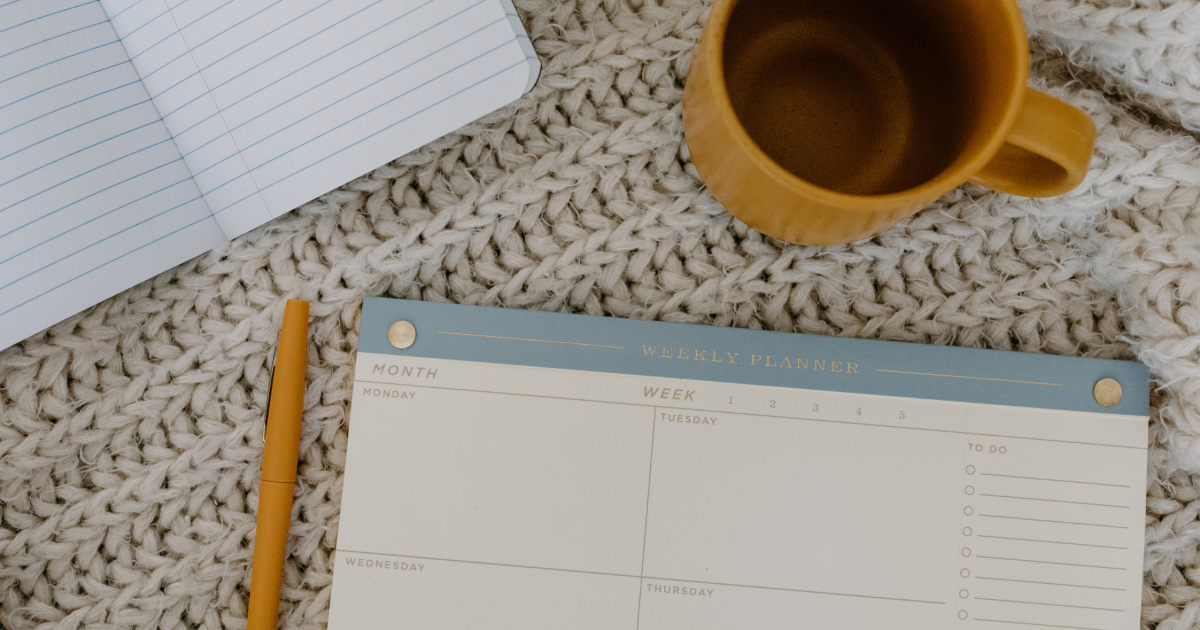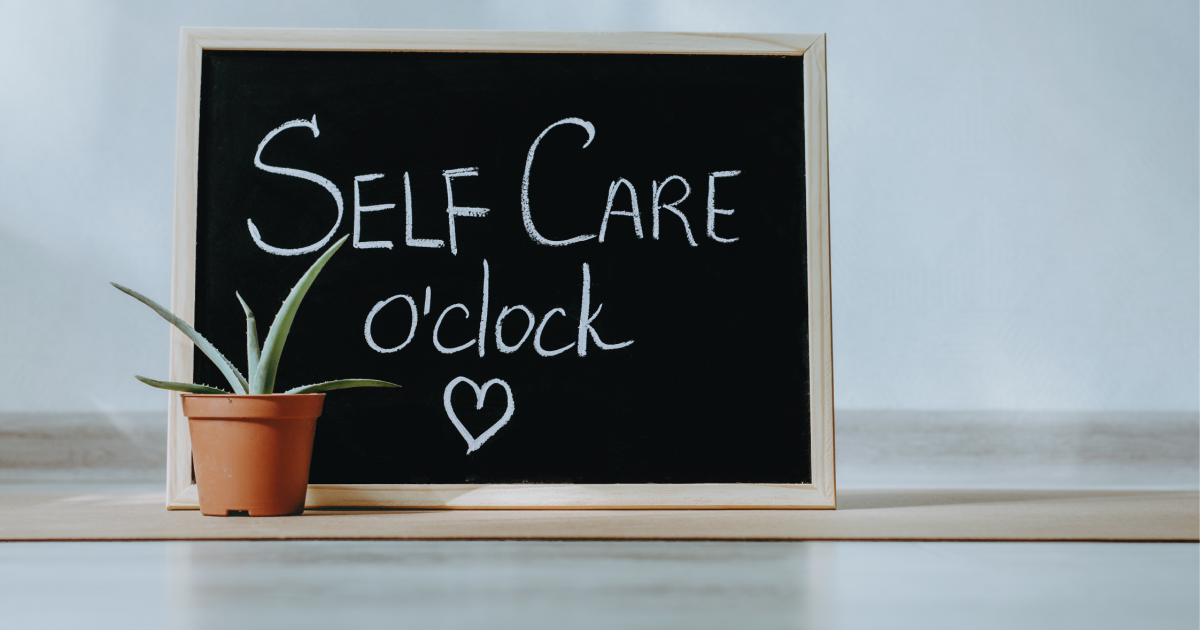When was the last time you truly checked in with yourself – not your inbox, not social media, but your mind? Probably not recently! Studies show that nearly one in five adults experience mental health challenges each year, yet fewer than half actively prioritize their mental well-being. In today’s hustle culture, where every moment is consumed by external demands, it’s often our minds that get left behind.
Social media often paints a picture where bubble baths, solo dates, or splurging on a shopping spree are the ultimate solutions to everything from physical health issues to mental health struggles. Don’t get me wrong – these things can be a nice escape for a moment. But let’s be real, if you’re dealing with unresolved trauma or the weight of past experiences, no amount of bubble baths will magically fix things. These quick foxes might provide temporary relief, but they won’t life you from the deeper challenges you’re facing.
Here’s the truth: without a healthy mind, there’s no lasting happiness or success. You can treat yourself to all the spa days in the world, but if you don’t address the root cause of your struggles, the overwhelm will always come back.
So, what do we do? We dig deeper. We face those underlying issues rather than just masking them with distractions that don’t last.
P.s. This has to be the most delayed blog post ever because I kept overthinking it! With my background in mental health studies, I wanted to create something that’s practical and easy to understand for everyone. But honestly, I kept getting lost in complicated ideas before realizing that sometimes, sticking to the basics is what really matters. I hope that this gives you a starting point – a nudge in the right direction. Even if you can implement just one or two ideas, you’ll be taking a step towards a better you. let’s dive in!
Table of Contents
Understanding Mental Health Basics

Before we dive into ways to improve mental health, it’s important to truly understand what mental health is and why it matters. Mental health isn’t just about the absence of mental illness; it’s about how we think, feel, and behave on a daily basis. It influences how we handle stress, relate to others, and make choices in life. Just as we care for our physical health by eating well and staying active, our mental health needs attention, too. Understanding mental health is the first step toward taking better care of ourselves, ensuring we stay balanced, resilient, and able to cope with life’s ups and downs.
What is Mental Health, Really?
When I first started learning about mental health, I remember feeling overwhelmed by all the complicated definitions, but at its core, it’s really about how we feel, think, and act. It’s how we handle stress, relate to others, and make decisions. In simple terms, mental health is about having a healthy mind, just like physical health is about having a healthy body. When our mental health is in good shape, we’re more likely to feel positive, manage challenges, and engage fully with life. But when it’s off balance, it can affect how we see ourselves, how we interact with the world, and even how we care for our bodies.
Taking care of your mental health means taking the time to nurture your mind, understand your emotions, and address your thoughts – just like you would exercise or eat right for your body. It’s essential for living a happy, fulfilling life.
The Connection Between Mental, Physical, and Emotional Health
You might have heard that mental health isn’t just “in your head” and that’s so true. Our mental, physical, and emotional health are all deeply connected – each one affects the others. For example, when you’re stressed or anxious, it can show up physically: tight muscles, headaches, and even stomach problems. On the flip side, physical activity can boost your mood and improve mental clarity, because exercise releases endorphins (those feel-good chemicals in your brain.)
Emotionally, if we ignore mental health issues, they can cause emotional ups and downs that feel uncontrollable. Managing our mental health allows us to deal with emotions in a healthier way, reducing the risk of things like depression or anxiety from taking over. So, caring for your mental health means caring for your whole self – body, mind, and emotions, and they all work better together when in harmony.
Breaking the Stigma and Misconceptions About Mental Health
I’ve been on both sides of the mental health conversation:
- someone who’s experienced struggles with mental health, and
- someone who’s seen others go through it too.
I can tell you from personal experience that there’s still a lot of misunderstanding and stigma surrounding mental health. I’ve heard people say that if you’re struggling, it means you’re weak or that you should just “snap out of it,” but that’s just not how it works. Trust me, dealing with mental health issues has nothing to do with being weak. Mental health issues can happen to ANYONE, regardless of how strong or capable they are.
One of the biggest myths I’ve come across is that you need a “big reason” for mental health struggles to be valid. I used to think that too, but it’s just not true. The reality is, mental health can be affected by a whole range of factors: genetics, stress, sleep, diet, or even things we don’t always notice, like burnout. Mental health struggles can show up in many ways, and they don’t need a “big reason” to exist.
The bottom line? Mental health is just as important as physical health, and we need to talk about it more openly. By breaking down the stigma, we create space for ourselves and others to seek help, learn, and grow. When we support each other in prioritizing mental health, it makes it that much easier to thrive, and that’s something I truly believe everyone deserves.
Creating a Mental Health-Friendly Daily Routine

There’s this concept of Mental Health Hygiene, and I believe it’s just as crucial as physical hygiene. Just like we take care of our physical hygiene – brushing our teeth, washing our face, and taking showers – mental health hygiene is just as important. It’s the practice of regularly taking steps to care for our mind, emotions, and overall well-being.
Mental Health Hygiene involves small, consistent actions that prevent mental exhaustion, stress buildup, and emotional overwhelm. It’s about checking in with yourself, recognizing when you need a break, practicing self-compassion, and engaging in activities that promote your mental wellness, whether it’s meditation, journaling, or just taking a moment to breathe.
Think of it as a daily routine that keeps your mind sharp and balanced, much like how brushing your teeth prevents cavities. By maintaining your mental health hygiene, you’re building a solid foundation for a healthier, more resilient mindset. And trust me, just like physical hygiene, the more you make it a habit, the more natural it becomes.
Morning Rituals That Set a Positive Tone for the Day
Your morning sets the tone for the rest of your day, and the good news is, you don’t have to be a morning person to make it work for you. Here are a few morning rituals that have helped me, and I think they can work for you too:
- Wake up early and soak some sunlight: I’ve recently added this to my morning ritual, and let me tell you, it feels so good. First thing in the morning, I step outside or open the windows to soak in some sunlight. It’s a game changer, especially during winter when the days are shorter. If you’re struggling to get going in the mornings, I definitely recommend making this a must-do part of your routine. It’s a simple but powerful way to start the day with some natural energy!
- Hydrate first thing: Drinking water is non-negotiables. I know during the winter months, we don’t feel as thirsty, but trust me, your body still needs that hydration. Sipping on a warm glass of water first thing in the morning gives me a real boost.
- Move your body: I’m not talking about an intense workout here – just a little movement. A short stretch or even a walk around the block can release tension and really help clear your mind. Personally, I love to stretch while soaking in the morning sunlight. It feels like a great way to start the day and get my body energized. Even five minutes makes a difference in how I feel mentally and physically!
- Say some affirmations: Okay, I’ve said this so many times, but I’m going to say it again – affirmations really do work! I’ve seen a huge shift in my mindset by simply taking a moment to say positive affirmations. Whether you’re focusing on your career, relationships, or just your personal well-being, they can set a strong tone for the day. If you’re looking for inspiration, I’ve put together a list of 150+ affirmations that cover a variety of areas in life. Trust me, they’re worth adding to your routine!
Evening Routines That Promote Mental Wellness and Better Sleep
The evening is when our bodies and minds need to wind down, but if we’re still carrying the weight of the day, sleep can feel elusive. Creating a calming evening routine helps relax, recharge, and sleep better. Here’s what I’ve found works:
- Unplug from screens: I recommend avoiding screens at least an hour before bed. The blue light messes with your sleep cycle, making it harder to fall asleep and get quality rest. Instead, switch to something calming, like reading or journaling. Trust me, your body will thank you in the morning!
- Create a wind-down ritual: Whether it’s light stretching or sipping on some herbal tea, having a wind-down ritual signals to your body that it’s time to relax. I love having a warm cup of herbal tea with a good book to end a hectic workday (feels heavenly).
- Reflect on the day: Before bed, take a moment to reflect on your day. What went well? What are you grateful for? What did you learn? This practice will help you release any lingering stress, so you can sleep peacefully and wake up with a clearer mind. I highly recommend the Five-Minute Journal. It has ready-made prompts for gratitude, intentions, and reflections, making it effortless to build a habit in just a few minutes.
- Set a bedtime routine: Aim to go to bed at the same time each night. Consistency is key for a solid night’s sleep, and it makes a huge difference in how you feel the next day. Personally, I’ve found that sticking to my bedtime routine helps keep my entire day in check. If I mess up my sleep cycle, everything else tends to follow suit!
Evening routines don’t have to be elaborate or time-consuming – they just need to work for you. The goal is to create a sense of calm that helps you unwind and prepare for a restful night’s sleep. When you make this a priority, you’ll wake up feeling more refreshed, energized, and ready to take on the day. It’s a small commitment with big returns for your mental and physical health.
Incorporating Mindfulness into Daily Activities
Mindfulness doesn’t require hours of meditation or a completely quiet mind – it’s about being present and fully engaged in the moment. It’s a simple, powerful practice that can seamlessly fit into your daily routine, no matter how busy life gets. If you’re new to mindfulness or want to dive deeper, I have a detailed guide that covers all the basics as well as advanced techniques. You can check it out here to learn how to incorporate mindfulness into your daily life for better mental clarity and calm.
Self-Care Strategies That "Actually" Work

Self-care has become such a buzzword lately that it’s hard to figure out what’s truly helpful versus what’s just a social media trend. I believe authentic self-care goes far beyond pampering. It’s about nurturing your mind, body, and soul in ways that genuinely help you grow and heal. Here’s how you can approach self-care in a way that actually works:
Redefining Self-Care: It’s More Than Pampering
Authentic self-care is about meeting your real needs, not just indulging in temporary escapes. Here’s how to make self-care a more meaningful part of your life:
- Identify What You Need: Self-care starts with recognizing your needs. Are you feeling exhausted? Maybe you need rest or time to disconnect. Feeling anxious? It could help to pause and identify your triggers. For instance, if work is overwhelming, you could start incorporating short breaks during your day – think of it as a mini-reset to recharge. Similarly, if you’re dealing with constant stress, a mindful activity like journaling or even deep breathing could work wonders.
- Make It Consistent: Self-care isn’t a one-off event; it’s about creating habits that align with your priorities and sticking to them. Think of it like building a routine – not one that feels forced, but one that feels personal and empowering. I used to think routines were dull and restrictive, but I realized that was because I wasn’t designing them around my needs. Now, my routine is my anchor – it helps me balance work, family, health, and me-time. The trick? Build a routine that works for YOU, not against you.
- Focus on Growth: Self-care isn’t always easy or glamorous. Sometimes, it’s about pushing yourself out of your comfort zone to do what’s truly good for you. During these freezing winter mornings, I’ve made it a habit to step outside for a quick 10-minute post-meal walk. Is it tough? ABSOLUETLY! But afterward, I always feel refreshed and accomplished. Self-care is about growth – sometimes, that means embracing the challenge and seeing the results.
Remember, authentic self-care is personal – it’s about what works for you, even if it doesn’t look “Instagram-worthy.” What matters is that it helps you feel better, grow stronger, and find balance in your life.
Evidence-Based Techniques/Rituals for Mental Well-Being:

Stress is inevitable, but managing it effectively can make all the difference. Here are some tried-and-true strategies to help you take control of your mental wellbeing:
- Deep Breathing: Slowing your breath signals your nervous system to calm down. It’s a simple, portable stress reliever. It’s great when you’re feeling overwhelmed, even in the middle of work. Check out this Pinterest Pin where I’ve shared four go-to breathing exercises that are easy to try anytime.
- Progressive Muscle Relaxation: This method helps you let go of tension by working through each part of your body. Start at your toes, tense them for 5 seconds, then release. Move up to your calves, thighs, and so on until you reach your head. It’s especially helpful at night to unwind after a long day.
- Time-Blocking: Organizing your day into chunks ensures you tackle tasks without feeling scattered. For example, reserve mornings for deep work, afternoons for meetings, and evenings for self-care. You focus better when you have clarity about what to do next. It also reduces the guilt of “not doing enough” because each task has its own time slot.
- Nature Therapy: Spending time outdoors isn’t just refreshing – it’s scientifically proven to lower cortisol levels. Take a 15-minute walk in the park, garden, or any green space. Observe your surroundings: the sound of leaves rustling or the warmth of the sun. Even a few minutes outside can boost your mood and help you feel grounded.
- Exercise: Regular movement releases endorphins, your body’s natural stress relievers. You don’t need to hit the gym for hours. Activities like yoga, or a 15-minute brisk walk can work wonders. If squeezing in time for movement feels impossible with your busy schedule, I’ve got you covered! Check out this list I’ve put together of simple and easy movements that you can easily fit into your day, no matter how packed it is.
Nutrition: What you eat affects how you feel, both physically and emotionally. Ensure to incorporate brain-boosting foods – Omega-3s (salmon, walnuts, flaxseeds), leafy greens, and berries help improve focus and mood. Limit processed foods – sugary snacks might give you a temporary high but can leave you feeling drained. Stay consistent – skipping meals or extreme dieting can mess with your energy and mood. Try to keep your meals balanced and nourishing.
These strategies aren’t just “quick fixes.” They’re small, sustainable habits that, when done consistently, can create big changes in your mental wellbeing. Give them a try and see what resonates with you!
Setting Boundaries for Better Mental Health

Setting boundaries is one of the most important, yet often overlooked, tools for maintaining your mental health. It’s not just about saying no to things that drain you – it’s about saying yes to your own peace of mind and well-being.
When you establish boundaries, you’re essentially saying, “I respect myself enough to protect my time, energy, and emotions.” And honestly, the impact on your mental health can be huge. It’s like you’re building a protective shield around yourself. Boundaries allow you to breathe, focus, and live life on your own terms without constantly feeling overwhelmed or resentful.
The Connection Between Boundaries and Mental Health
Setting boundaries is about recognizing your limits and protecting your energy. Without clear boundaries:
- You might feel overwhelmed, resentful, or drained.
- Your mental health can suffer as you stretch yourself too thin.
- Healthy boundaries create space for self-care, focus, and personal growth.
Boundaries are a way to preserve your mental health. They remind you that you are worthy of respect, space, and time for yourself. They are the foundation of self-care, ensuring you don’t fall into the trap of constantly putting everyone and everything else ahead of yourself.
Strategies for Maintaining Work-Life Balance:
Work-life balance is something I’ve always struggled with, but I’ve learned that it’s not about achieving perfection – rather, it’s about creating space for both work and relaxation in a way that feels good for you. Over time, I’ve found these strategies helpful in maintaining a healthier balance:
- Set boundaries with work: Please, write it on a poster in your room or make it your New Year’s resolution: learn to say NO. Seriously, it’s a skill that can change your life. There’s nothing wrong with saying “no” when your plate is already full – this doesn’t make you mean or rude. In fact, there are so many polite ways to do it, and I’ve never had anyone get upset with me for saying no (is it because everyone around me is super nice or because I’m really good at communicating? Let’s go with the latter – I’ll just flex a bit). Setting clear boundaries is key because it helps you separate work stress from your personal life. Trust me, it’s liberating.
- Schedule “me time”: This is so important. Even if it’s just 30 minutes to read, take a walk, or watch something fun, carve out time for yourself – no work allowed. For me, “me time” starts with sitting quietly and getting to know myself better. It’s crazy how we think we know ourselves, but in reality, we don’t – especially if we avoid sitting with our own thoughts. If you’re ready to peel back the layers of your personality and learn more about who you really are, I’ve put together a Self-Awareness Journal with prompts to help you get started. And of course, it’s absolutely free! Download it and start your own journey of self-discovery.
- Take regular breaks: If you’re like me, you might have a habit of working straight through lunch or staying glued to your screen. Well, I’ve learned that taking short breaks every 60 minutes has made a huge difference in how I feel mentally. It’s not just about stepping away from work it’s about saying to myself, “Hey, I’m doing something for ME.” Whether it’s a short walk or just a quick breath of fresh air, it feels so liberating. I’ve never felt more mentally clear since I started this habit. Trust me, you’ll be more productive too.
- Be mindful of work hours: This is a game-changer. When the workday ends, make it a non-negotiable rule to leave work behind. That means no checking emails, no lingering over projects. This helps you mentally detach and focus on family, hobbies, or whatever relaxation means to you.
Maintaining work-life balance is about creating those boundaries and intentionally making space for what’s important to you!
Digital Boundaries and Mental Wellness

We live in a time where we’re constantly connected to our devices – whether it’s work emails, social media notifications, or just the endless scroll. While technology can be useful, it’s crucial to set limits to avoid burnout. Constant screen time can leave us feeling mentally exhausted, disconnected from the real world, and overstimulated.
Here’s how you can set digital boundaries for better mental health:
- Limit your screen time: Try setting specific hours for social media and stick to them. It’s okay to say, “I’ll check emails from 9-11 a.m. and then again after lunch, but I’m not available after 6 p.m.”
- Create tech-free zones: This could mean keeping your phone out of the bedroom or turning off notifications during dinner. These small changes help you disconnect from the digital world and reconnect with yourself or the people around you.
- Unfollow accounts that drain you: If there are accounts or groups on social media that make you feel bad, unfollow them. Your digital space should make you feel empowered, not stressed.
Pro tip: Every Sunday, I dedicate at least an hour to decluttering my digital space – whether it’s clearing out my email inbox, unsubscribing from YouTube channels, or unfollowing Instagram accounts. I don’t do everything in one go, but I’ve set aside this time each week to tidy up my digital life. Ngl, it gives me a sense of satisfaction and organization that’s hard to beat. It’s like a little dopamine boost every time I hit “unsubscribe” or “delete!”
Common Boundary-Setting Challenges and Solutions
Now, I know that setting boundaries isn’t always easy. It’s not like you just say, “I’m going to set boundaries now,” and everything magically falls into place. There are real challenges that come up, like guilt or fear of disappointing others. But here’s the thing: You deserve to set boundaries, and here’s how to navigate those challenges:
- The fear of disappointing others: We all want to be liked and avoid conflict, but remember – boundaries are about self-respect. If you’re worried about letting someone down, be kind but firm. Saying no to a request doesn’t mean you’re a bad person; it just means you’re prioritizing your mental health.
- Guilt: This is a big one. You might feel guilty when you take time for yourself or say no. But think of it this way – when you take care of yourself, you’re better able to show up for others. Self-care isn’t selfish; it’s necessary.
- Pushback from others: Some people might not be thrilled with your boundaries at first. They might try to pull you back into your old habits of people-pleasing. But don’t back down! Stay consistent, and eventually, people will learn to respect your limits. And for those who don’t, even with time, it’s okay to let them go. The ones who truly matter will stick around, no matter what!
Setting boundaries can feel challenging at first, but it’s a crucial step toward better mental health. They’re not about shutting people out; they’re about creating the space you need to thrive. Start small, and over time, you’ll notice a positive shift in how you feel and function.
Professional Mental Health Support

Now, before you roll your eyes and think, “Ah, not again,” let me stop you right there. I get it. That’s often the reaction when people looking for mental health tips hear the suggestion to seek professional help. And honestly, I don’t blame anyone for feeling that way – it’s society that has built this taboo, making therapy seem like a last resort or something to be ashamed of. It’s no wonder so few are willing to see a psychologist, psychotherapist, or psychiatrist when it comes to their mental health.
But here’s the thing: at some point, you may feel completely stuck. You’re doing all the “right” things, practicing mindfulness, exercising, journaling, and even trying self-care routines that are supposed to make you feel better, but nothing seems to help. That’s when seeking professional help becomes not just an option but a necessity. It’s not about failure or weakness; it’s about recognizing that sometimes, you need guidance from someone who’s trained to help you work through the deeper layers of what you’re experiencing.
When to Seek Professional Help
How do you know it’s time to stop relying on self-help and reach out for professional guidance? Here are some signs to look out for:
- You feel stuck: Despite trying different things, self-help books, routines, or advice, you don’t feel any better or like you’re making progress.
- Overwhelming emotions: If feelings like sadness, anxiety, anger, or hopelessness are constant and don’t seem to go away, that’s a big indicator.
- Changes in sleep or appetite: Trouble sleeping (too much or too little) or big changes in how much you’re eating can signal deeper mental health struggles.
- Difficulty functioning: When simple daily tasks, like going to work or interacting with others, start to feel exhausting or impossible.
- Feeling disconnected: If you feel numb, detached, or like you’re just “going through the motions” in life, it’s worth looking into.
- Using unhealthy coping mechanisms: Turning to things like overeating, alcohol, or other distractions to avoid your feelings.
- Constant worry or panic: Persistent anxiety or panic attacks that interfere with your life.
- Relationship struggles: If conflicts with family, friends, or partners feel unmanageable and leave you emotionally drained.
- Thoughts of self-harm: Any thoughts of harming yourself or feeling like life isn’t worth living are serious signs to seek help right away.
It’s important to realize that it’s okay to ask for help. Recognizing the need for support isn’t defeat; it’s self-awareness. I’d also suggest not waiting until you’ve hit the wall or feel like you’re drowning. If life feels too overwhelming or you don’t have a solid support system, whether it’s friends, family, or siblings, or even if you do, but don’t feel comfortable leaning on them, that’s okay too. It’s completely normal to feel this way, and at such times, reaching out to a psychotherapist can be a game-changer. They’re trained to provide the guidance and support you might need to navigate through those tougher days.
Final Thoughts
Taking care of your mental health isn’t a one-time task; it’s an ongoing journey. It’s about making small, intentional changes, setting boundaries, and giving yourself grace along the way. Whether it’s incorporating daily rituals, reaching out for professional help when needed, or simply learning to say no, every step you take towards prioritizing your mental well-being counts. Remember, you don’t have to have it all figured out right now – take it day by day, and trust that even the smallest changes will lead to big transformations.
You deserve to feel good, inside and out, and your mental health should always be a priority. So, don’t wait until everything feels overwhelming – start with one thing today, and keep building from there. You’ve got this!

